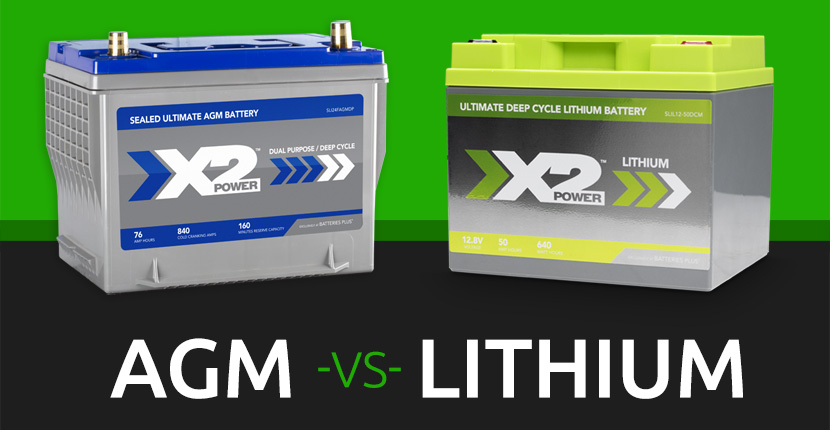Lithium vs. AGM
- by Joe Weber - updated on 12/16/2022

If you have a solar energy system in your home, a boat with a trolling motor or other accessories, or an RV then you most likely have a deep cycle battery as part of your arsenal. Lithium iron phosphate (LiFePO4) batteries have been taking over the market in recent years. Learn more about what makes them so popular and the key differences between lithium and Absorbed Glass Mat (AGM) batteries.
What Are Lithium and AGM Batteries Used For?
Throughout this article, we will be talking about deep cycle batteries as lithium is only available as a deep cycle solution. So what are deep cycle AGM and lithium batteries even used for?
The most common uses for deep cycle batteries are for solar energy storage, RVs, golf carts, and boats. Some other applications that utilize deep-cycle batteries are floor scrubbers, electric vehicles, forklifts and more.
6 Factors To Compare
When shopping for deep cycle batteries you should look at these 6 details while comparing AGM to Lithium to determine which is right for your equipment's power demands and your budget.
1. Cost
Lithium batteries do tend to have a steeper upfront cost when compared to AGM. In some cases a lithium battery can cost 4x the price of the AGM equivalent option; however, the higher upfront cost is made up for with the longer lifespan, greater energy density and other benefits.
2. Weight
Lithium batteries are on average a third of the weight of their lead acid counterparts. When you consider some RV battery banks, this can save 100s of pounds. Some RVs with large battery banks of four or more batteries can see a drastic drop in weight which will help with engine performance and fuel economy.
As an example, the Group 31 AGM battery runs at a hefty 69.5 pounds vs. the X2Power lithium Group 31 battery at only 28.2 pounds. If you have a large RV with a battery bank of 4 deep cycle batteries you could easily save over 150 pounds. While it doesn't sound like much, weight savings puts less strain on the engine and potentially boosts your fuel economy. According to the Environmental Protection Agency every 100-pound weight reduction equates to roughly a 1-2% increase in fuel economy. When you have a large RV, delaying a fill-up by even a small amount is welcome.
3. Energy Density and Size
A major benefit of lithium technology is they have much greater energy density than lead acid batteries. Meaning, lithium batteries can store up to 4 times more energy in the same size battery than their lead acid battery counterparts. Higher energy density also translates to a smaller size. You can have a much smaller battery with the same amount of power to help free up space that could otherwise be used for something else. This is hugely important in mobile applications where weight and space tend to be limited like in RVs and boats.
4. Maintenance and Lifespan
While both AGM and lithium batteries have very low maintenance, lithium edges ahead just a bit. AGM does not require routine watering like flooded lead acid batteries but they are still susceptible to undercharging and overcharging which can lead to a dangerous buildup of hydrogen sulfide gas. Many lithium batteries, like all of our X2Power Lithium deep cycle batteries, contain a built-in battery management system (BMS) that monitors certain parameters of the battery to prevent early failure from overcharging and undercharging.
5. Safety
As you will most likely be sleeping and living in close proximity to a battery bank in an RV, safety is paramount. AGM batteries need to be stored in an area with proper ventilation in your RV to prevent the buildup of hydrogen gas that can be dangerous to breathe indoors and even cause fires or explosions in rare cases if a spark occurs. Lithium batteries do not produce this gas and are safe to use and store indoors.
6. Efficiency
Lithium batteries are generally more efficient than lead batteries in many ways. They have roughly 10% more available power than lead acid batteries, consistent power throughout the discharge cycle from 100% charge down to 1%, lower self-discharge to reduce charging needs when storing and up to 3 times faster charging to get you out on the road faster.
AGM batteries do tend to have better performance in extreme hot or cold conditions. If you are planning on using batteries in these environments, AGM batteries may perform better than lithium.
Final Thoughts
Despite the higher price tag, lithium batteries, especially our X2Power LiFePO4 deep cycle batteries, are the recommended battery for most deep cycle applications. They're more efficient, smaller, lighter and the list goes on. These batteries may be an investment but once you experience for yourself how powerful and long-lasting they are, there is no going back and you'll wonder why you didn't switch sooner.
Batteries Plus is Your Deep Cycle Headquarters
Stop into your local Batteries Plus to see all of our deep cycle battery solutions for your machine. If you would like to learn more about what makes lithium iron phosphate batteries so great, read our article "What is a Lithium Iron Phosphate Powersport Battery and How Does It Work?"